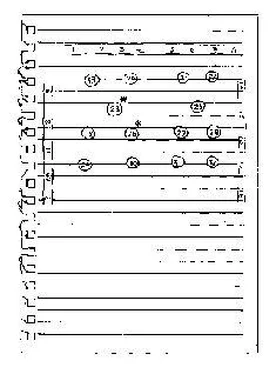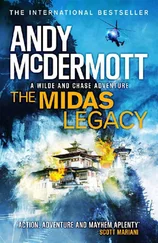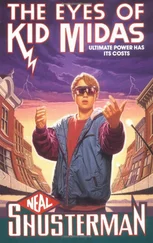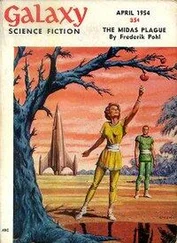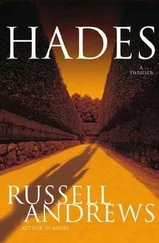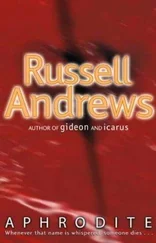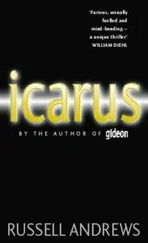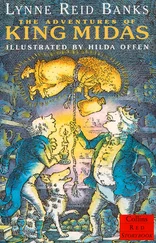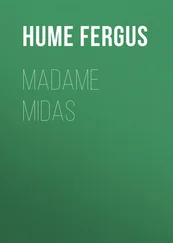Russell Andrews - Midas
Здесь есть возможность читать онлайн «Russell Andrews - Midas» весь текст электронной книги совершенно бесплатно (целиком полную версию без сокращений). В некоторых случаях можно слушать аудио, скачать через торрент в формате fb2 и присутствует краткое содержание. Жанр: Триллер, на английском языке. Описание произведения, (предисловие) а так же отзывы посетителей доступны на портале библиотеки ЛибКат.
- Название:Midas
- Автор:
- Жанр:
- Год:неизвестен
- ISBN:нет данных
- Рейтинг книги:3 / 5. Голосов: 1
-
Избранное:Добавить в избранное
- Отзывы:
-
Ваша оценка:
- 60
- 1
- 2
- 3
- 4
- 5
Midas: краткое содержание, описание и аннотация
Предлагаем к чтению аннотацию, описание, краткое содержание или предисловие (зависит от того, что написал сам автор книги «Midas»). Если вы не нашли необходимую информацию о книге — напишите в комментариях, мы постараемся отыскать её.
Midas — читать онлайн бесплатно полную книгу (весь текст) целиком
Ниже представлен текст книги, разбитый по страницам. Система сохранения места последней прочитанной страницы, позволяет с удобством читать онлайн бесплатно книгу «Midas», без необходимости каждый раз заново искать на чём Вы остановились. Поставьте закладку, и сможете в любой момент перейти на страницу, на которой закончили чтение.
Интервал:
Закладка:
With lists.
He began with the first man killed-Bradford Collins. To the right of his name, Justin put the date of his death, the date of the Harper’s bombing. Next to that, Justin began to list all the scraps of information he had about Collins. He was the CEO of the Texas energy company EGenco. Justin realized he had only a vague idea of what EGenco did-it was in the oil and energy business-and that what he mostly knew was that the company was immersed in a burgeoning scandal rivaling that of Enron. So he skipped over to the right and wrote in, “Understand EGenco.” Beneath that he added, “Details of corporate scandal.” And underneath that, he added, “Follow the money.” He underlined that last phrase for emphasis. Going back to the third column, Justin quickly scribbled everything else he knew: that Collins was a friend of the vice president of the United States, Phil Dandridge, and of the attorney general, Jeffrey Stuller; that Collins was sitting at or very near to the detonation point of the Harper’s explosion; that it was possible that the briefcase that contained the explosives had been given to Collins or someone else having lunch at his table. That reminded him of something else he needed to check, and he added this question: “Who was Collins having lunch with at Harper’s?” He stared at his own handwriting for a moment, not the worst he’d ever seen but not the most legible either, and finally he added two more questions: “Who the hell is Bradford Collins?” and “Why would anyone want him dead?”
He decided to stick with chronological order, so next on his list was Hutchinson Cooke. Justin put down the date the small plane crashed, November 7-the day of Jimmy Leggett’s funeral-and added the following information: the make of the plane, a Piper Saratoga, and its tail number: NOV 6909 Juliet. He scribbled in a few comments about his conversation with the ditzy Cherry Flynn-the name she’d given him, Martha Peck, the head of the FAA, and the fact that Cooke’s files had been removed prior to the crash, indicating that someone knew the crash was going to happen. He added the info that Wanda Chinkle had given him, about Cooke’s Air Force background, that he flew government officials, that for the previous eighteen months he seemed to have disappeared from the Air Force and had been collecting a salary from a company called Midas Ltd. Justin’s pen hovered over his yellow legal pad as he hesitated about making a first but very tenuous link: victim number one was a friend of Vice President Dandridge; victim number two had piloted government officials. To get a private pilot, one had to be fairly high up in the government-but as high up as the vice president? Justin added a new page to his list, with the heading “Connections.” And he added that one-followed by quite a few question marks. Even if the link was a legitimate one, he didn’t know what it could mean. But he left it on the page.
Chuck Billings was next and Justin had to put his emotions aside. He needed to be objective here, and the fact that Chuck had been his friend was irrelevant to the investigation. So he narrowed his known information about Chuck to this: the head of the Providence bomb squad had a meeting with someone from the FBI the day he was killed. He had anticipated danger because he’d sent Justin all his notes on the Harper’s bombing for safekeeping. Chuck suspected that the first bombing wasn’t a suicide bombing-and the key information was the sound of the cell phone ringing. Chuck believed the FBI was covering up the truth. He had a meeting scheduled with Wanda Chinkle for the day after he died. Justin closed his eyes, reached into his brain to see if he could come up with anything else of importance, but he didn’t think there were any more key facts. So, in the far right column, for the things he needed to know, he wrote:
“Who did Chuck meet with the day he died?”
and
“Read his notebook again.”
and
“If not suicide bombing, who made the cell phone call to detonate the bomb?”
and
“Sound of cell phone at La Cucina?”
and
“Jacks-were they found at the La Cucina bombing? How can signature be used to identify suspect?”
There were two names left. First was Martin Heffernan. Known info: “Works for FAA. Probably responsible for murdering Hutch Cooke.” Under “Need to Know,” Justin wrote, “Who was his direct boss? Who gave him the order to kill Cooke? Why was he killed-to stop him from talking?”
The final name was Ray Lockhardt. Justin kept his notes brief for Ray. What he knew was: “Shot at point-blank range. Threatened by Heffernan in name of FAA. Knew that Cooke was murdered by rigging plane.” In the far right column, he wrote, “Who killed him?” then “Why was he killed?” After that, he hesitated, held his pen in the air, frozen, and finally wrote, “Because I fucked up.”
Justin put the pen down on the desk, went to the computer, and began tapping at the keyboard to enter his list. He didn’t do this just because he liked things neat and clean-although he did; his life might be chaotic and raw but he preferred his investigations to have all their edges rounded off and smooth-but rather because he found that when he transferred his notes, when he typed, he usually found something new to add to the equation. Just one more step in the thinking process. He’d been doing it long enough, and successfully enough, that he knew the process wasn’t always rational. Subliminal thoughts crept in, and, while he didn’t always know what they meant or why he was asking the questions he asked, he trusted those instincts. And he trusted his questions. It was a lot like doing a crossword puzzle, Justin always thought. You could stare and stare at a clue and draw a total blank on the answer. Then you could put the puzzle aside, take a nap, do anything to keep from thinking about the specifics, and you’d pick it back up again later, look at the same clue, and the answer would be right there. It was hard to stop the brain from working once it latched onto something. He knew that well. It was why he drank so much and kept a nice little cache of grass at all times. Sometimes he needed his brain to stop working. Sometimes he had to stop it from working.
Sure enough, his ritualized process was successful again. Sitting at Jimmy’s old desk, Justin wound up typing in several new entries. By Ray Lockhardt’s name, he added that he’d been shot with a.38. He also added a notation: “Killed between 7 and 8 P.M., same night as La Cucina bombing.” When he put in the information about Bradford Collins, he realized that people murdered other people for three basic reasons: passion, money, and protection. With Collins, it was fairly safe to rule out the first category-a jilted lover might shoot someone, but blow up a roomful of strangers? — but the last two could be valid. So he added: “Money?” and then: “What did he know? What could he tell? Who could he hurt?” For Cooke, he typed in: “Where was he going? Where had he come from?” And then: “Passenger?” and “Cargo?” and, thinking back to Chuck Billings’s notes, “Connection to Semtex?”
He ran the cursor back over to Bradford Collins’s name, let it linger there for a moment, waiting for the thought he knew was going to emerge. It did and he threw his hands up, wondering why he hadn’t thought of this before. He quickly went online, went to the New York Times Web site, because he knew they’d kept a running track of the bombing victims, and ran down the list of all those known to be killed at Harper’s. There were a few names he recognized, Jimmy Leggett’s among them. When he came to Jimmy’s listing he almost did a double take. Jimmy’s death already seemed disconnected from what he was investigating, and for a moment Justin was actually surprised to see it there, but then he realized that he was only making this list because Marjorie had asked him to find out what had happened to her husband. He shivered involuntarily, yet again surprised at the brain’s ability to make wounds that seem so raw recede into the background, then he kept scrolling through the names. He didn’t know what he’d expected to find, but whatever it was wasn’t there. He saw the name of a local contractor he knew, a big guy with a bad temper who once, while installing storm windows in Justin’s East End house, had taken a swing at Justin after listening to a complaint about some of the workmanship. Justin hadn’t taken kindly to the contractor’s attempt to remove his head from his neck. While the guy was off balance after Justin ducked his punch, Justin grabbed a lamp and used it in one swift and compact motion to break the contractor’s nose. There was a lot of blood and a lot of swearing, neither of which had particularly bothered Justin. Nor did it bother him to find out the guy was now dead. Justin was not big on grudges. But on the other hand, he found no real reason to grieve over assholes.
Читать дальшеИнтервал:
Закладка:
Похожие книги на «Midas»
Представляем Вашему вниманию похожие книги на «Midas» списком для выбора. Мы отобрали схожую по названию и смыслу литературу в надежде предоставить читателям больше вариантов отыскать новые, интересные, ещё непрочитанные произведения.
Обсуждение, отзывы о книге «Midas» и просто собственные мнения читателей. Оставьте ваши комментарии, напишите, что Вы думаете о произведении, его смысле или главных героях. Укажите что конкретно понравилось, а что нет, и почему Вы так считаете.
